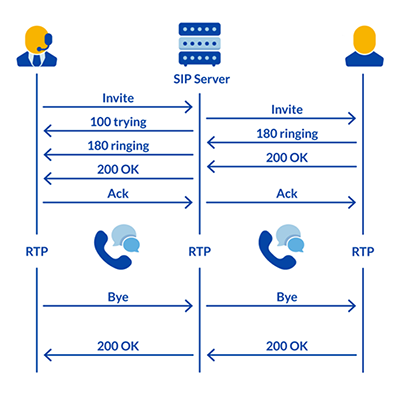Categories
New Blog
The Session Initiation Protocol (SIP)
November 02 , 2021What is SIP?
The Session Initiation Protocol (SIP) is a signaling protocol used for initiating, maintaining, and terminating real-time sessions that include voice, video and messaging applications.
SIP is one method of Voice Over Internet Protocol (VoIP). Other methods of VoIP include Real-time Transport Protocol (RTP), Real-time Transport Control Protocol (RTCP), and Session Description Protocol (SDP). The primary benefit of SIP is that it provide direct connection between private local telephone system (private branch exchange or PBX) and public telephone network. Thus, it does not need a legacy telephone to connect individuals and businesses.
How SIP Works
SIP works in conjunction with several other protocols that specify and carry the session media. Most commonly, media type and parameter negotiation and media setup are performed with the Session Description Protocol (SDP), which is carried as payload in SIP messages. SIP is designed to be independent of the underlying transport layer protocol and can be used with the User Datagram Protocol (UDP), the Transmission Control Protocol (TCP), and the Stream Control Transmission Protocol (SCTP). For secure transmissions of SIP messages over insecure network links, the protocol may be encrypted with Transport Layer Security (TLS). For the transmission of media streams (voice, video) the SDP payload carried in SIP messages typically employs the Real-time Transport Protocol (RTP) or the Secure Real-time Transport Protocol (SRTP).
The Call Flow Diagram

Tonmind IP Speakers support SIP Protocol. Other supportive protocl includes HTTP, IPv4, DHCP, RTSP, RTP, RTCP, TCP, UDP, ARP, FTP, TFTP, NFS.
(Note: SIPS/TLS, HTTPS, IPv6, SRTP can also be added on customer's demand).
Tags :